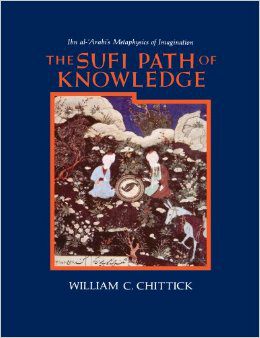Part of the Casswiki article series Books

The Sufi Path of Knowledge: Ibn Al-Arabi’s Metaphysics of Imagination is William C. Chittick’s translation of more than 600 passages by Sufi al-Shaykh Akbar, Ibn al-‘Arabi (A.D. 1165-1240), a well-known mystical thinker of Islamic civilization.
This scholarly translation work was first published in 1989 and consists of over 500 pages with seven sections on Ibn al-‘Arabi’s theology, ontology, epistemology, hermeneutics, and soteriology. It has become the most important work in the study of Islamic mystical theology. Chittick made available an extensive clear translation of Ibn al-‘Arabi’s works and placing them in their theological context and removing many misunderstandings that had previously reigned among Muslims and in the West.
This work is one of the FOTCM recommended readings and is discussed and quoted in Laura’s works, including [[The Wave Series|The Wave]].
As Laura wrote in 46th chapter of The Wave:
It was at this point in time that the session (June 1, 1996) occurred where the Cs supposedly accused me of trying to take credit upon myself for the material, and that this resulted in many of the attacks I had experienced. As the reader now suspects, that was altogether untrue, and we can now view this as evidence that, after so long an absence of Terry at the board, as well as along with my deteriorating physical condition, Frank’s controllers were seeing their plans coming to fruition and in that session, had made the putsch to try to send me over the edge.
Immediately after this session, I was so depressed that I ended up sick again. As is usual, unless I am completely unable to see or function, I have always tried to make my sick time count for something useful. On this occasion, the only book in the house that I hadn’t really read was a new one that had sat on the shelf for a couple of years, untouched, which I now proposed to read. It was William Chittick’s translation of the works of the great Sufi Shaykh, Ibn al-‘Arabi, The Sufi Path of Knowledge. I struggled through the dry introduction, and gradually began to realize that the Shaykh must have been drawing his information from the same source as the Cs were. It was all so familiar, so similar, so full of synchronous passages that described in great detail the many things the Cs were telling us. I was astonished. It was third-party confirmation that what the Cs were saying was derived from a very ancient knowledge exactly as they suggested. But obviously, without the Cs more modern explication, the deeper reality was difficult to see since so much time had transpired since Al-‘Arabi had written his Futuhat. But taking the loss of understanding that takes place over time, as well as the loss that occurs when something is translated from one language to another, it was stunningly clear that the Cs communication was something more amazing than even I had suspected. I was not only strengthened, I felt that I had made some sort of inner connection to this tradition of knowledge…
Not only Ibn al-‘Arabi’s teachings are illustrated with many passages introducing readers to the ways of spiritual life, but it also contains advices that are very relevant to today’s struggles, including how to navigate psychic phenomena.
